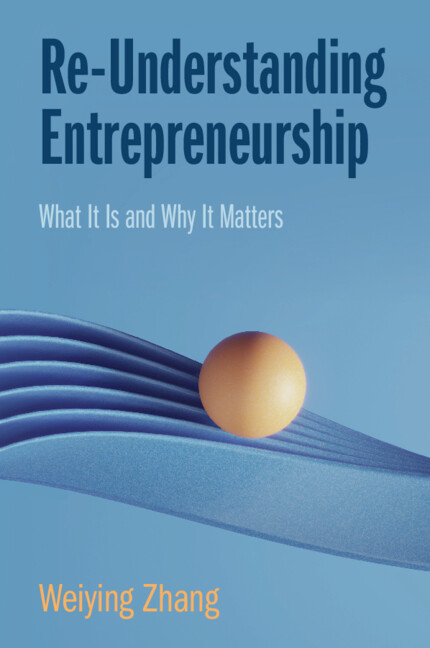
Entrepreneurship has been the theme of my research for four decades. My first article on entrepreneurship was published in 1984. I must confess, however, that I had not truly understood the nature of entrepreneurship until a few years ago. The reason is that I was trapped in mainstream (neoclassical) economics. I had always been a strong defender of the neoclassical system! Fortunately, I have eventually realized that the neoclassical paradigm doesn’t apply to entrepreneurial decision-making. To truly understand what entrepreneur do and thus how the market works, we must break away from the neoclassical paradigm. My new thinking of entrepreneurs is contained in my new book Re-Understanding Entrepreneurship: What It Is and Why It Matters.
The following three points are the pillar of my re-understanding entrepreneurship.
First, Entrepreneurial decision making is not scientific decision making!
Entrepreneurial decisions are different from managerial decisions. Decision making in economics and management studies is managerial decision making, not entrepreneurial decision making. Managerial decision making is scientific decision making, which is based on data and calculation. Given data, the optimal choice is singular. Entrepreneurial decision making is based on alertness, intuition, imagination, and judgment. Different people have different thoughts and judgments about the same data, so choices will be different. Therefore, scientific decision making can form a consensus and has a standard answer but entrepreneurial decision making is non-consensus and does not have a standard answer. Alternatively, decisions with standard answers are not entrepreneurial decisions.
From the perspective of entrepreneurial decision making, the answer the majority of people believes is correct might actually be incorrect. We see that the most important decision making by outstanding entrepreneurs were often not originally acknowledged by the majority of people or were even considered preposterous. Entrepreneurs do not make decisions according to majority opinion. Of course, the opinion of the entrepreneur might be incorrect. But we have no way to judge correctness before the future arrives. Majority opinion cannot be the standard for judgment.
The reason data and calculation do not play a key role in entrepreneurial decision making is because entrepreneurial decision making faces a high degree of uncertainty, as argued by Frank Knight in his 1921 book Risk, Uncertainty and Profit. So-called uncertainty refers to the subjective, unknown, and unique future affairs faced by entrepreneurial decision making. There are no statistical samples, probability distribution, or objective data available.
Further, uncertainty is not exogenous, but endogenous. It is influenced by current and future choices of various interactive players, not pre-determined by what happened in the past, just waiting to be revealed. The same action brings about countless possible consequences. In Shackle’s words, the future is not only uncertain, but also indeterminate.
Under uncertainty and indeterminacy of the future, imagination plays a vital role in entrepreneurial decisions. Indeterminacy implies choice can make a difference in the history to come. Imagination is not a prediction of the future, but a blueprint for the future; not what might be, but what should be; not possibility that will be determined by some external factors, but possibility that is dependent upon your choices; not something to be discovered, but something to be created; not something for you to adapt to, but something for you to lead to. For example, when Henry Ford imagined a mass market for automobiles in the early 1900s, he meant to make it happen. Without his imagination, it would have been impossible for 60% of American households to have a family car by 1930.
I do not dismiss the importance of data and scientific decision making in the management of firms. Actually, in my view, more than 95% of decisions in well-established firms are managerial decisions that can rely on the scientific decision making methods learned in management schools. However, entrepreneurial decisions that determine the fate of the firm are different from managerial decision making and are not scientific. Managerial decisions can be delegated to non-entrepreneurial people, but entrepreneurial decisions can be made only by entrepreneurs. Confusion between them and misjudgment can lead to fatal mistakes.
Second, entrepreneurial decision making is not finding a solution with given constraints; it is changing the constraints themselves.
According to the standard economic theories, the firm maximizes the objective function (profit) under given constraints (including resources, technology, consumer preferences, and given institutions and policies). The constraints are exogenous; entrepreneurs have no way to change them. Therefore, decision making is just a computational program.
This type of rational decision making model is a far cry from entrepreneurial decision making in the real world. For entrepreneurs in the real world, constraints are never given but instead can be changed. Resources, technology, and consumer preferences are not given and even the rules of the game can be changed. Of course, not all of the constraints can be changed, but entrepreneurs will never consider all constraints to be given and unchangeable. A person that does not have the ability to change constraints cannot possibly become a successful entrepreneur. So-called innovation in essence is changing constraints to do what appears to be impossible.
People that want to change constraints are certainly confident in their own ideas. Pessimists do not have the impulse to change the status quo. Entrepreneurs are more optimistic than ordinary people. They believe “dreams” can come true and “assumptions” can become reality.
In fact, entrepreneurs are often excessively optimistic. Entrepreneurs’ confidence in success is much greater than the ex-post statistical probability. It is precisely excessive optimism that makes entrepreneurs do many things (such as major innovation) that are impossible from the perspective of rational calculation. I often hear from successful entrepreneurs that if they had known how hard it would be, they would not have started. Underestimating challenges is common for entrepreneurs but is also a major reason that entrepreneurs become entrepreneurs.
For entrepreneurs to turn their imagination into reality, they must have the ability to change other’s beliefs, to persuade others to do the things hoped for. In Steve Jobs’ case, this ability was called a “reality distortion field.” In fact, according to my observation, all outstanding entrepreneurs must have this kind of reality distortion field.
Uncertainty means that no entrepreneur can control all external factors. Even if entrepreneurial activity succeeds in changing constraints, it might fail. After success, people say the entrepreneur is a hero; after failure, he is a “swindler”! The difference between a swindler and an entrepreneur is entrepreneurs make a promise because they believe they will fulfill it.
Third, entrepreneurs have objectives beyond profit.
Profit maximization is a standard assumption in mainstream economics. Any behavior that deviates from profit maximization is an undesirable phenomenon caused by the agent’s moral hazard, which will lead to efficiency loss and should be curbed. In many cases, this type of assumption has value for our understanding of firm behavior and market operations. However, this kind of assumption also misleads our understanding of the real world. In the real world, at least from the perspective of outstanding entrepreneurs, making money is not their sole objective, nor is it the end goal.
Joseph Schumpeter believed that entrepreneurs are driven by three non-monetary motives: (1) “the dream and the will to found a private kingdom,” (2) “the will to conquer,” and (3) “the joy of creating.”
Schumpeter is right! Entrepreneurs pursue not only profits, but also great success and the realization of their dreams. This is precisely the reason many entrepreneurial decisions cannot be justified by “expected profit maximization.” When entrepreneurs not only consider monetary compensation, but also non-monetary reward, they often “lose money” to do things that shake the heavens and move the earth.
I am not negating the importance of profit in entrepreneurial decision making. Actually, on the contrary, I believe the profit system ensures the compatibility of entrepreneurs’ personal goals and social interests. On the one hand, in the market economy, profit is a symbol of success for entrepreneurs. Even if they are not driven by profits, entrepreneurs must make money as a means to achieve their life goals. For ordinary people, the point of making money is to take care of their family. For entrepreneurs, making money is a means to realize success. On the other hand, from the social perspective, if a firm’s revenue cannot exceed cost, then in most cases it means the entrepreneur wasted society’s precious resources. Profit is the whip that society uses to drive entrepreneurs to exert themselves. Profit is also a cage that constrains entrepreneurial behavior within a reasonable scope.
Traditional societies did not lack the type of ambitious people that are entrepreneurs in the market economy. However, on average, the bad things they did far exceeded the good things. Some people even brought about tremendous social disasters. The reason is they were not constrained by profit. Even if they made repeated mistakes, they could continue to acquire resources through violence. They could go further and further down the mistaken road. By comparison, under the market economy, because of profit constraints, entrepreneurs cannot keep making mistakes.

Latest Comments
Have your say!